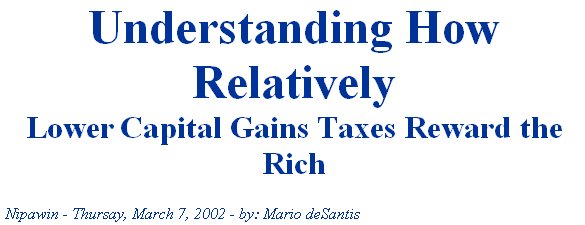Learning Stories
by
Mario deSantis
mariodesantis@hotmail.com
“I am a Canadian, free to speak without fear, free to worship in my own way, free to stand for what I think right, free to oppose what I believe wrong, and free to choose those who shall govern my country.” - -The Rt. Hon. John Diefenbaker, Canadian Bill of Rights, 1960
“The whole judicial system is at issue, it's worth more than one person.”--Serge Kujawa, Saskatchewan Crown Prosecutor, 1991
“The system is not more worth than one person's rights.”--Mario deSantis, 2002
Ensign Stories © Mario deSantis and Ensign
|
|
|
|
It is my understanding that the privatization of our social and economic system on behalf of our corporations and our fortunate sons has contributed to the narrowing of our overall understanding of what is socially good for all of us. A political system based on the pure economics to make money with money is conceptually undemocratic and this is why we need governments which pursue the social good of people rather than pursue the vested interests of our corporations and our fortunate sons. Our responsibility as citizens is to understand what is good government for ourselves, however with the privatization of our governments we have abdicated our civic responsibilities to our corporations and our fortunate sons. It is time to take back our civil responsibilities from our corporations and fortunate sons and try to understand the policies of our governments and how they affect our own overall good. I came across today (March 6) the excellent article "Capital Games" by Tim Francis-Wright describing how the US taxes on Capital Gains reward the rich. This article is very educational and therefore I am going to provide some excerpts so that we can become more knowledgeable on how Capital Gains taxation policies affect our pockets and our economy. Tim Francis-Wright writes: Both the federal government and most states tax income from capital gains more lightly than they do income from interest, dividends, or wages. Government does have a real need to keep tax policy from quashing entrepreneurial ventures. But most capital gains have nothing to do with entrepreneurship or venture capital. The real reason for the preferential treatment has more to do with the beneficiaries of capital gains than with the assets themselves... A superficially attractive notion is to index capital gains for the effects of inflation. For example, if I bought stock five years ago for $1,000 and sold it today for $1,200, I would have a gain of $200, even though the $1,200 that I have after the sale is not worth much more than my $1,000 used to be worth. But consider an alternative investment. Let's call this exotic investment a savings account. If I deposit $1,000 into this account and earn $40 in interest per year for five years, then I have to pay taxes each year on the $40 of interest. My stock investment already had an advantage over the savings account because I did not have to pay any capital gains taxes until the sale. It does not need the bonus of a lower tax rate on the gain. Ironically, despite its less favorable tax treatment, the alternative savings account is potentially more important to the health of the economy: my investment allows my bank to lend money to businesses and individuals who need it... Each year, the IRS compiles heaps of information about individual tax returns in Publication 1304. The latest version has information from a large sample of 1999 tax returns... The 7.5% of taxpayers with adjusted gross income over $100,000 recognized 84.9% of the capital gains. These numbers spell out the sheer audacity of continued calls for capital gains cuts. The major beneficiaries will be the richest Americans... The booming stock markets of the 1990s generated capital gains that brought in oodles of cash for the federal government. The unexpected government surpluses at the end of the Clinton administration depended on the unexpected levels of capital gains income from the exercise of stock options and from the sales of stock of investors... It is hard for government spending to act as regulator for the economy if the stock market is a key driver of government revenues. In 1999, capital gains accounted for almost 10 percent of federal adjusted gross income... But capital gains policy is instrumental in the continued propping up of the stock and real estate markets. The key consideration is not that the capital gains rate is a certain number, but that it is significantly below the maximum ordinary income rate. It rewards the rich for playing the market. Reference: |
